Tag Archive for: Culture
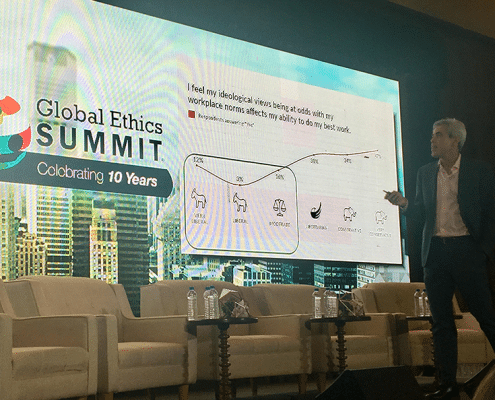
Jon Haidt Presents Keynote on “Maintaining Ethical Culture” at Global Ethics Summit 2018
Blog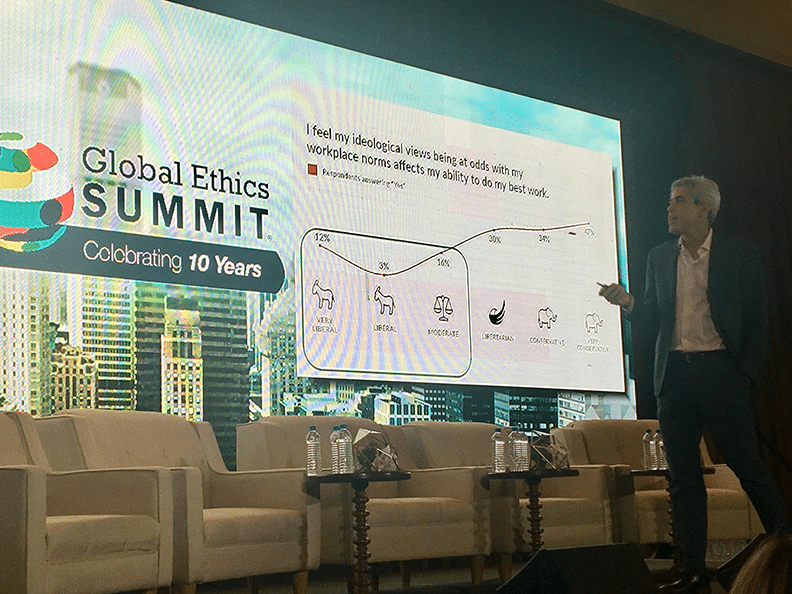 In today's polarized political climate, it is even more important to know how to engage in constructive dialogue in order to advance mutual business interests and perpetuate a sustainable organizational culture of ethics and respect.
In today's polarized political climate, it is even more important to know how to engage in constructive dialogue in order to advance mutual business interests and perpetuate a sustainable organizational culture of ethics and respect.
Addressing this head on, Ethical Systems co-founder Jonathan Haidt delivered a mid-day keynote entitled Maintaining Ethical Culture in a Political Whirlwind on day 1 at Ethisphere's Global Ethics Summit 2018.

Caterina Bulgarella Dispels the False Meme that Culture Is Intangible
Blog Featured Interview: Caterina Bulgarella PhD, Culture Architect and Ethics Expert
Featured Interview: Caterina Bulgarella PhD, Culture Architect and Ethics Expert
What are your current areas of work and research?
Both my work and research focus on organizational culture. Over time, this work has become one and the same with building ethics in organizations, consistent with the evolution companies have been going through over the past 10-15 years. Ethical behavior underlines a powerful cocktail of ingredients (e.g., self-regulation, moral awareness, ability to ‘self-organize’ in the face of missing information, etc.). These human qualities and behaviors are also what organizations need to master the unprecedented level of complexity and change they face today.
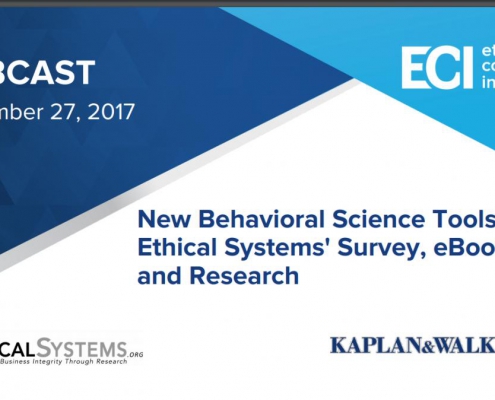
ECI Webcast Recording: New Behavioral Science Tools from Ethical Systems
Blog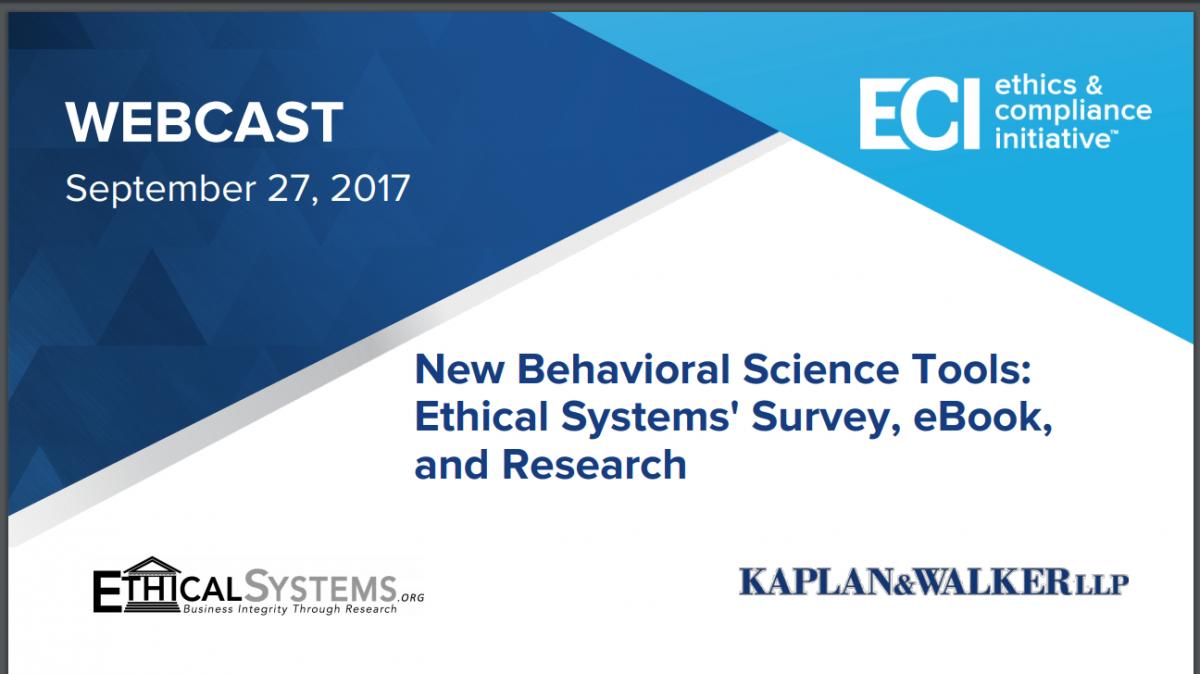 Azish Filabi (Executive Director of Ethical Systems) and Jeffrey Kaplan (ES collaboarator and Partner at Kaplan & Walker, LLP) recently led a webcast about ethics, research, and culture highlighting new behavioral science tools for the ethics and compliance field. The slides and recording are now available.
Azish Filabi (Executive Director of Ethical Systems) and Jeffrey Kaplan (ES collaboarator and Partner at Kaplan & Walker, LLP) recently led a webcast about ethics, research, and culture highlighting new behavioral science tools for the ethics and compliance field. The slides and recording are now available.
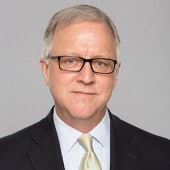
Featured Culture and Business Ethics Expert: Marshall Schminke
BlogFeatured Culture and Business Ethics Expert: Marshall Schminke, BB&T Professor of Business Ethics at the University of Central Florida
 What are your main areas of research around business ethics?
What are your main areas of research around business ethics?
I focus on the idea that ethics don’t happen in isolation. They emerge from a complicated mix of individual and situational factors. My research explores this messy stew and how it drives ethical behavior. More specifically, I study the impact of organizational structure and culture on individual ethics, such as trying to understand climates that support or resist ethical decision making, abusive supervision, moral emotions, and ethical efficacy. My work also examines how ethical and unethical action drifts through organizations. I study how factors like trust and fairness—which provide the foundation for organizational ethics—“trickle down” the organization from managers to supervisors to line employees. Understanding these patterns helps to explain why relatively small changes in ethical or unethical activity may lead to profound, organization-wide effects.
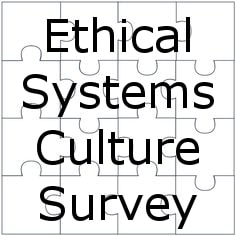
Introducing the Ethical Systems Culture Measurement Tool
Blog Ethical culture is the linchpin to running an ethical organization. Yet, while everyone agrees that culture is a vital aspect of any successful organization there is no consensus on how to analyze and measure it. At Ethical Systems, we are working with the top researchers on organizational culture and have developed assessment tools that companies can use. Our new Ethical Systems Culture Measurement site provides a suite of modules designed to measure various elements of organizational culture.
Ethical culture is the linchpin to running an ethical organization. Yet, while everyone agrees that culture is a vital aspect of any successful organization there is no consensus on how to analyze and measure it. At Ethical Systems, we are working with the top researchers on organizational culture and have developed assessment tools that companies can use. Our new Ethical Systems Culture Measurement site provides a suite of modules designed to measure various elements of organizational culture.

Retail Bank Incentive Schemes in Australia
Blog Dennis Gentilin is the author of “The Origins of Ethical Failures” (Routledge, 2016) and the Founding Director of Human Systems Advisory.
Dennis Gentilin is the author of “The Origins of Ethical Failures” (Routledge, 2016) and the Founding Director of Human Systems Advisory.
Last week, Mr Stephen Sedgwick AO released the findings from his review into remuneration arrangements for retail banking staff in Australia (the final report can be downloaded here). The review is part of a broader program of work being undertaken by the Australian Bankers Association that is aiming to address the culture and conduct issues within the banking sector.
With this objective in mind, the review represents a significant (albeit small) step in the right direction. Although some may question whether Mr Sedgwick went far enough, he has squarely placed the ball in the banks’ court and left them under no illusions that change is needed.

Sharing: The Five Levels of Building an Ethical Culture
Blog
Bank Culture: Can regulators have an impact?
Blog A March 14 New York Times Dealbook article by David Zaring of the Wharton School looks at bank culture from a regulatory perspective and questions why NY FED regulators are taking on the grand task of attempting to make culture and ethics an important part of bank supervision- especially when “creating and regulating culture by regulatory fiat is so difficult.”
A March 14 New York Times Dealbook article by David Zaring of the Wharton School looks at bank culture from a regulatory perspective and questions why NY FED regulators are taking on the grand task of attempting to make culture and ethics an important part of bank supervision- especially when “creating and regulating culture by regulatory fiat is so difficult.”
Ethical Systems has made fortifying ethical corporate culture a main concentration of our efforts, as there is no better determinant to predicting misconduct. An ethical systems approach to business ethics considers the interplay between corporate culture with considerations for how to motivate individual to be more ethical (nudging),and the regulatory (guiding policies that impact behavior and outcomes).
When examining company culture, leaders should consider whether it is one in which company values are infused into all aspects of the operation, where managers lead by example and teams are encouraged to speak up about ethics and other issues? Or, if it is a culture in which checking the compliance boxes off a list is seen as most important and certain behavior is tolerated by high-performers but not allowed for others?

Interview with Rashmi Airan: Law, Blindspots, Prison and Redemption
Blog An interview with Rashmi Airan, speaker on ethics, law and culture; leadership and compliance consultant; and growth strategist
An interview with Rashmi Airan, speaker on ethics, law and culture; leadership and compliance consultant; and growth strategist
Background:
Rashmi was a successful lawyer who graduated with honors from Columbia Law School. After working for several major corporations, she launched an independent law practice in Miami, Florida. During the housing boom, she was recruited to work with a local real-estate developer who later engaged in shady business practices. Her involvement resulted in a one year sentence in Federal prison, alongside a $19M judgment against future earnings, required community service hours and 3 years supervised release. As a mother of two and devoted community activist, Rashmi has reconfigured her subsequent career to focus on growth strategies and leadership/compliance training for firms, corporations, and graduate schools. She has also become widely known as a public speaker, sharing her story to help illustrate the ethical perils and situations that can result from a drive to succeed and the blindspots created when pursuing a goal.
This interview has been edited and condensed from a conversation on January 19, 2017.
1) What are the main takeaways from your story that you want others to know?
I believe there are many reasons why I am telling my story. I want to help people so that they do not find themselves in the same predicament that I was in and make different choices when faced with daily “gray” decisions. I finally came to a place of peace that I had done something wrong when I gave myself the freedom to forgive. After I forgave myself, my lessons became clearer. I reflected on different business relationships and the fact that I had not looked into things deeply enough. I know there are lessons for both young and seasoned professionals. I believe I can enlighten people to the fact that there is a fine line and we must all walk between the two sides of right and wrong and choose to be on the right side of the line.

Behavioral Ethics: From nudges to norms
Blog Scott Killingsworth, Senior Counsel with Bryan Cave, LLP, writes a broadly applicable and thought-provoking piece on nudges vs. culture. Killingsworth illustrates how a strong ethical culture can take the place of consistent, ongoing nudges and shows that culture should be considered through the lens of not just preventing ethical mishaps, but also about creating a positive environment “where the good apples can thrive”.
Scott Killingsworth, Senior Counsel with Bryan Cave, LLP, writes a broadly applicable and thought-provoking piece on nudges vs. culture. Killingsworth illustrates how a strong ethical culture can take the place of consistent, ongoing nudges and shows that culture should be considered through the lens of not just preventing ethical mishaps, but also about creating a positive environment “where the good apples can thrive”.
